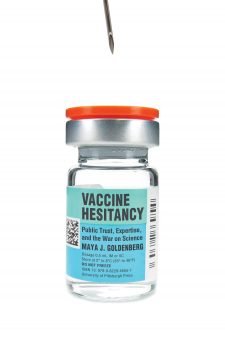The Surprise of COVID Vaccine Hesitancy Among Health Care Professionals
26 July 2021
The COVID vaccines were the one big hope story for the dismal year of 2020. The first shipments arrived in December to a few high-income countries and rollout started immediately amidst “joy and relief”.[1] The first phase of the rollout was supposed to be the easy part. Vaccinate residents in long-term care (LTC) settings as well as front-line health care workers. Both populations were seen as easy to organize for vaccine administration. Residents could be vaccinated on site. This effort went well. Health professionals would presumably show up to wherever the vaccines were provided to them. Here, the rollouts ran into difficulty.
Health officials, journalists, and members of the public were surprised to learn of vaccine hesitancy among first-in-line health care workers. A rush of news stories shared startling figures: in Toronto, for example, only 43% of roughly 3000 LTC staff in city-owned facilities had consented to vaccination in comparison to 91% of residents.[2] A December poll of 2000 LTC staff in France showed 76% did not intend to get vaccinated.[3] A German study of 2300 health professionals found half of nurses and a quarter of physicians would refuse COVID vaccines.[4]
This reluctance was not worked into vaccine rollout planning. The distribution plans presumed efficient up-take and offered no supportive resources for health care staff. Yet this “surprise” should have been expected. Health care workers have never been uniformly vaccine confident. A small body of research shows health care professionals wavering on seasonal and pandemic influenza uptake;[5] nurses unions have fought workplace mandates in courts.[6] So why was COVID vaccine hesitancy among health care workers so poorly predicted?
The surprise and ill-preparedness lie partly in the high-risk nature of health care work during COVID. Prioritized health care staff worked in close proximity to patients every day, even patients with COVID. But there was more. There was surprise, and lack of preparedness, because healthcare workers do not fit the profile of vaccine hesitators and refusers. Vaccine hesitators are widely thought to misunderstand the science, whereby low scientific literacy is popularly seen as the root cause of vaccine hesitancy.[7] Health care workers are presumably more scientifically literate than average due to professional training. The “surprise” points to this perceived dissonance. For example, Italy’s Deputy Minister of Health responded to COVID vaccine refusal by Italian health care professionals by saying,
I am perplexed when I hear of fellow doctors or nurses reluctant to get the vaccine. I can understand it regarding a member of the public who perhaps does not have the scientific understanding, but frankly, I think that those doctors and nurses, if they still have doubts after seeing everything that’s happened, are probably in the wrong job [8]
Science communicators, journalists, and bloggers have propagated this view of misinformed and uneducated people hesitating about vaccines for years in trying to explain why the problem persists and how to fix it. It has taken hold of collective thinking about vaccine hesitancy. Yet it is a false narrative.[9] Vaccine hesitancy metrics do not correlate with levels of education; indeed, affluent and educated people are among the most vocal vaccine critics. Vaccine hesitancy, as well as vaccine confidence, strongly correlate with social group membership. Vaccine attitudes are tied to various political and ideological commitments. Indeed, politicians exploit those connections when they implore their constituents to “trust science” or, conversely, champion freedom of choice. Those social ties that bind every one of us to various social groups and identities are better predictors of vaccine confidence than education levels. That is not to say that evidence and logic are irrelevant. Rather, cognition is socially and culturally implicated.[10]
In addition to health care workers being part of professional communities, they, like every one of us, are members of other communities that define our social, emotional and cultural identities. There is then no reason to think health care workers do not have the same questions and concerns regarding the new covid vaccines, the same challenges navigating the many unknowns of new biotechnologies, and the same difficulties finding the information one needs in order to make a confident decision. Health care staff are also diverse in terms of their social locations, histories, and experiences, all of which bear on vaccine confidence and hesitancy.[11]
There is no reason to think that one’s employment within a health care system guarantees high levels of confidence in its norms and practices. Vaccine hesitant health professionals cited safety concerns due to the rapid development and authorization of COVID vaccines.[12] This is not scientific illiteracy, but suboptimal trust in regulatory practices.
It is well known that the public are wary of commercialized health care. Vaccine hesitators and refusers strongly criticize “Big Pharma” and weak regulatory oversight of this powerful industry.[13] It was with an eye towards shoring public trust, and with that, access to huge markets, that several vaccine manufacturers published their trial protocols in advance of trial completion. But transparency is not enough. The trials had not selected primary endpoints that patients and collapsing health systems are most interested in: reduction in severe illness requiring hospitalization and interruption of virus transmission.[14] It is commonplace for industry to tailor clinical trials towards meeting regulatory approval standards rather than measuring the outcomes that patients and providers really want to know. It was unfortunate lack of leadership by government purchasers for not demanding that the most useful endpoints be built into the studies. Health care professionals are feeling the impact, both in their vaccine communications with patients and the public, and in their own vaccination decision-making. Front-of-the-line health workers needed to decide on vaccination even with important gaps in our knowledge: Do the vaccines stop transmission to other people? Are they safe during pregnancy? Will they impact fertility? With no offerings of educational and decision-making supports, health care workers had little direction on how to navigate these uncertainties and unknowns.
Regarding social location, COVID has put in stark relief a tenet of population health: social determinants of health create grave health inequalities between communities. Racialized communities have suffered disproportionate harms of COVID-19. This is tied to its members’ living and working conditions. Those experiences of not being adequately protected and supported during the pandemic have elicited anger and mistrust of government efforts to prioritize vaccination in hard-hit neighbourhoods. [15] Many of these communities have antagonistic relationships with health care systems and government as a result of past and current experiences of medical racism and other injustices. Not trusting “the system” creates epistemic barriers to reliable vaccine information, and vaccine disinformants capitalize on this with targeted messaging that feeds on the insecurities and anxieties of racialized, religious minority, and immigrant communities. Many health care workers are members of these communities.
Health care professionals, like everyone, need culturally sensitive vaccine information from trusted sources. Vaccine supports must also be trauma-informed. The working conditions throughout the pandemic have been difficult, demoralizing, and even traumatic. For those reasons, health care workers deserve sympathetic recognition and response to their reasons for vaccine hesitancy. Health care leadership should ensure health professionals have the same opportunities to get information, ask questions, and express concerns as the rest of the population should be receiving. Numerous health care organizations quickly pivoted to offer “vaccine ambassador” programs for their staff. These conversations must be done with patience and kindness, starting with the assumptions that it is reasonable to have questions about the new vaccines and that those questions ought to be answered honestly and respectfully. It is from here that an equitable and responsive approach to health care worker vaccination can happen.
Citations
[1] Canada Administers its First COVID-19 Vaccine Shots. Globe and Mail, Dec 14, 2020. https://www.theglobeandmail.com/canada/article-canada-administers-its-first-covid-19-vaccine-shots/
[2] Uptake for the COVID-19 Vaccine has been High Among Toronto’s Long-Term-Care Home Residents. For Staff, Not So Much. Toronto Star, January 16, 2021. https://www.thestar.com/news/gta/2021/01/16/uptake-for-the-covid-19-vaccine-has-been-high-among-torontos-long-term-care-home-residents-for-staff-not-so-much.html
[3] Vaccine Scepticism Among Medics Spark Alarm in Europe and US. Irish Times, January 7, 2021. https://www.irishtimes.com/news/world/europe/vaccine-scepticism-among-medics-sparks-alarm-in-europe-and-us-1.4452612
[4] Vaccine Scepticism Among Medics Spark Alarm in Europe and US. Irish Times, January 7, 2021. https://www.irishtimes.com/news/world/europe/vaccine-scepticism-among-medics-sparks-alarm-in-europe-and-us-1.4452612
[5] Kose, Sukran, et al. Vaccine Hesitancy of the COVID-19 by Health Care Personnel. International Journal of Clinical Practice 2020; 75(5):e13917.
[6] Vaccination Policies in Workplaces: To Mandate or Not to Mandate. Gowling WLG, December 21, 2020. https://gowlingwlg.com/en/insights-resources/articles/2020/workplaces-vaccination-policies-to-mandate-or-not/
[7] For example, Lewis, Rick. Measles and an Outbreak of Scientific Illiteracy. PLoS DNA Science (blog), February 14, 2019. https://dnascience.plos.org/2019/02/14/measles-and-an-outbreak-of-science-illiteracy/
[8] Vaccine Scepticism Among Medics Spark Alarm in Europe and US. Irish Times, January 7, 2021. https://www.irishtimes.com/news/world/europe/vaccine-scepticism-among-medics-sparks-alarm-in-europe-and-us-1.4452612
[9] Goldenberg, Maya J. Vaccine Hesitancy: Public Trust, Expertise, and the War on Science. University of Pittsburgh Press, 2021.
[10] Goldenberg, Maya J. Vaccine Hesitancy: Public Trust, Expertise, and the War on Science. University of Pittsburgh Press, 2021.
[11] Goldenberg, Maya J. Vaccine Hesitancy: Public Trust, Expertise, and the War on Science. University of Pittsburgh Press, 2021.
[12] Dror, Amiel A., et al. Vaccine Hesitancy: The Next Challenge in the Fight Against COVID-19. European Journal of Epidemiology 2020 35(8): 775-559/
[13] Lyman, Stuart. Pharma’s Tarnished Reputation Helps Fuel the Anti-Vaccine Movement. STAT News, February 26, 2019. https://www.statnews.com/2019/02/26/anti-vaccine-movement-pharma-tarnished-reputation/
[14] Doshi, Peter. Will Covid-19 Vaccines Save Lives? Current Trials Aren’t Designed to Tell Us. BMJ 2020;371:m4037
[15] Racialized Canadians have Some of the Highest Rates of COVID-19 Infections in the Country. Who can Allay their Doubts about Taking the Vaccine? Globe and Mail, January 26, 2021. https://www.theglobeandmail.com/canada/article-racialized-canadians-need-the-covid-19-vaccine-more-urgently-than-most/
- October 2025
- September 2025
- August 2025
- July 2025
- June 2025
- May 2025
- April 2025
- March 2025
- February 2025
- January 2025
- December 2024
- November 2024
- October 2024
- September 2024
- August 2024
- July 2024
- June 2024
- May 2024
- April 2024
- March 2024
- February 2024
- January 2024
- December 2023
- November 2023
- October 2023
- September 2023
- August 2023
- July 2023
- June 2023
- May 2023
- April 2023
- March 2023
- February 2023
- January 2023
- December 2022
- November 2022
- October 2022
- September 2022
- August 2022
- July 2022
- June 2022
- May 2022
- April 2022
- March 2022
- February 2022
- January 2022
- December 2021
- November 2021
- October 2021
- September 2021
- August 2021
- July 2021
- June 2021
- May 2021
- April 2021
- March 2021
- February 2021
- January 2021
- December 2020
- November 2020
- October 2020
- September 2020
- August 2020
- July 2020
- June 2020
- May 2020
- April 2020
- March 2020
- February 2020
- January 2020
- December 2019
- November 2019
- October 2019
- September 2019
- August 2019
- July 2019
- June 2019
- May 2019
- April 2019
- March 2019
- February 2019
- January 2019
- December 2018
- November 2018
- October 2018
- September 2018
- August 2018
- July 2018
- June 2018
- May 2018
- April 2018
- March 2018
- February 2018
- January 2018
- December 2017
- November 2017
- October 2017
- September 2017
- August 2017
- July 2017
- June 2017
- May 2017

